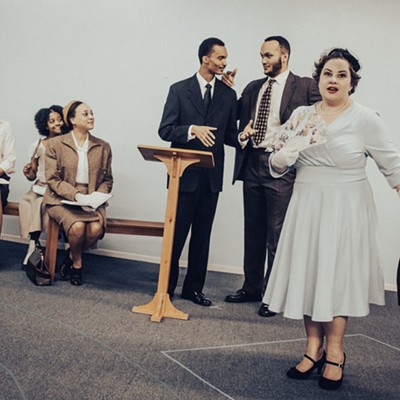Spinster. Old maid. Miss Grundy. Wilis. Unmarried women have been cultural punching bags and punchlines since Athena and her sister Virgin Goddesses hung up their chitons. One epithet I hadn’t heard before gives us the title of John Henry Redwood’s gentle 1996 romance, set in Harlem during World War II.
Considered by some critics as Chekhovian in its approach to comedy, The Old Settler tells of the longings and aspirations of sisters (just two of them) as a male interloper rearranges relationships, with a young hussy upending all metaphorical apple carts. The small-cast one-set play provides suitable channels for New Horizon Theater’s creativity and talents.
Directed by Eileen J. Morris, artistic director of the Ensemble Theatre in Houston and a regular contributor to the Pittsburgh arts scene, Settler is a lovely and loving portrayal of African-American life of that era. Curious about but daunted by Harlem’s new flash and audacity, the two sisters take pride as respectable church-going ladies preserving the music and traditions of their upbringing.
The story is simple enough: The elder maidenly sister rents a room to a stranger vouched for by a church deacon. The young man, a wide-eyed country naif, raises the hackles of the younger, once-married sister. He thinks he’s looking for his girlfriend from back home, but instead finds a May-December romance with his sympathetic landlady.
A little rough around the edges, the cast is charming: Rita Gregory as Elizabeth, grasping at happiness; Brenda Marks as her sharp-tongued and ever-suspicious sister Quilly; Melessie Clark running away from her old life to grab onto a new one; and the ever-able Jonathan Berry as the oddly named Husband Witherspoon, who has serious mommy issues. Kudos too to graphic designer Herbert Newsome for his landscape of the Harlem brownstone that adorns the program cover.
Settler balances binary tensions — urbane/rural, pious/profane, poise/poseur, and especially the sibling rivalry — then skewers them with shards of doubt for a bittersweet but believable resolution.















